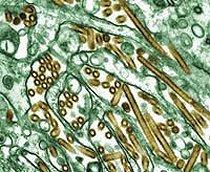2007年VOA标准英语-Scientists Study Old Virus to Predict Impact of
时间:2019-01-09 作者:英语课 分类:2007年VOA标准英语(一月)
Washington
17 January 2007
If or when it strikes, the avian flu pandemic would likely kill victims by switching on an uncontrolled immune system response. That's according to researchers, who studied a 90-year-old flu virus in the hope of finding clues on how to fight a modern-day bird flu. VOA's Jessica Berman reports.

H5N1 bird flu virus
Researchers wanting to get a better idea why the dreaded 1 H5N1 pandemic might be so deadly studied the 1918 Spanish flu, which killed 50 million people, many of whom were healthy, young adults.
Researchers altered the early 20th century virus at a biosafety lab in Winnipeg, Canada to make it genetically 2 similar the H5N1 virus. Then scientists infected seven macaque monkeys with the altered virus.
The experiment was supposed to last three weeks. But after eight days, the monkeys become too sick to live.
"Monkeys were affected 3 severely 4 enough that required euthenization," he said.
Yoshihiro Kawaoka, a virologist at the University of Wisconsin, led the study which was published in Nature.
Unlike other avian flu viruses which are eventually controlled by the immune system, Kawaoka and colleagues found that their 1918 flu model stimulated 5 an uncontrolled immune response.
"The severe illness found in patients in 1918 and animals in infected with 1918 virus was due to continued replication of the virus which triggered unusual immune response," said Kawaoka.
The investigators 6 say that may help explain why so many young people died of influenza 7 in 1918. Their healthy immune systems may have fueled the virus.
Co-author Michael Katze of the University of Washington says despite such research, no one can predict what would happen in the next flu pandemic.
"I think it's extremely critical to develop animal models with these highly pathogenic viruses so that should there be another epidemic 8 or pandemic, we will have the models in place, we will have the drugs tested, we will have the vaccines 9 tested, so that we will be better prepared. I think that's what this is all about," he said.
- The dreaded moment had finally arrived. 可怕的时刻终于来到了。
- He dreaded having to spend Christmas in hospital. 他害怕非得在医院过圣诞节不可。 来自《用法词典》
- All the bees in the colony are genetically related. 同一群体的蜜蜂都有亲缘关系。
- Genetically modified foods have already arrived on American dinner tables. 经基因改造加工过的食物已端上了美国人的餐桌。 来自英汉非文学 - 生命科学 - 基因与食物
- She showed an affected interest in our subject.她假装对我们的课题感到兴趣。
- His manners are affected.他的态度不自然。
- He was severely criticized and removed from his post.他受到了严厉的批评并且被撤了职。
- He is severely put down for his careless work.他因工作上的粗心大意而受到了严厉的批评。
- The exhibition has stimulated interest in her work. 展览增进了人们对她作品的兴趣。
- The award has stimulated her into working still harder. 奖金促使她更加努力地工作。
- This memo could be the smoking gun that investigators have been looking for. 这份备忘录可能是调查人员一直在寻找的证据。
- The team consisted of six investigators and two secretaries. 这个团队由六个调查人员和两个秘书组成。 来自《简明英汉词典》
- They took steps to prevent the spread of influenza.他们采取措施
- Influenza is an infectious disease.流感是一种传染病。
- That kind of epidemic disease has long been stamped out.那种传染病早已绝迹。
- The authorities tried to localise the epidemic.当局试图把流行病限制在局部范围。